Unit2 WHAT DO YOU DO ON SUNDAY Lesson 7 教案-公开课-优质课(北京版一起精品二上)
冀教版英语四年级上册 Unit 2 At Home

Practice
What do you do at home?
I __p_l_a_y__o_n__th__e_c_o__m__p_u_t_e_r_________.
Language points
1. —What do you do at home? 你在家做什么? —I talk on the phone with my friends. 我和我的朋友在电话里交谈。 句型结构: What do you do at home? 答句: I + 动词原形 + 其他.
I sing a song.
What do you do at home?
2. Pair work. Ask and answer. Then tick.
( )I write a story. ( √ )I do my homework. ( )I read a book. ( )I help my mum and dad.
①What do you do at home?
I play on the computer.
Let's learn
TV
computer
phone
Language points
1. —What do you do at home? 你在家做什么? —I talk on the phone with my friends. 我和我的朋友在电话里交谈。 详解:本句是用来询问对方在家做什么及其回答的句型。 on the phone意为“在电话里;通过电话”,表示方 式、方法,with意为“和……一起”; talk with sb. 意为“和某人交谈”
五年级英语上册 Unit2 My week 单元测试 人教版(PEP)(含答案及解析)
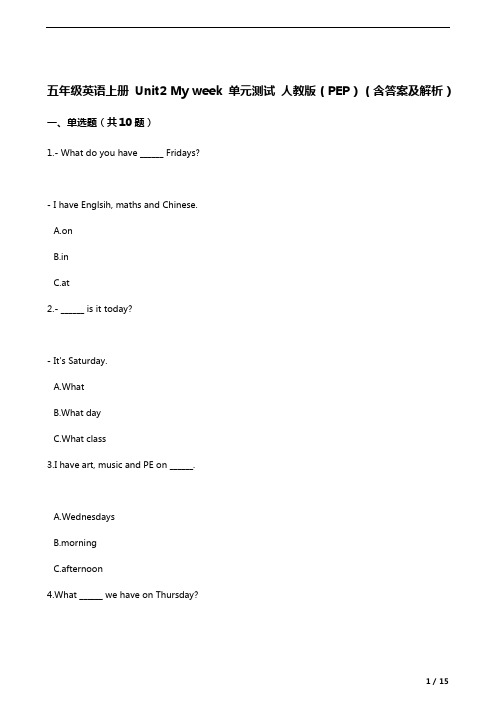
五年级英语上册Unit2 My week 单元测试人教版(PEP)(含答案及解析)一、单选题(共10题)1.- What do you have ______ Fridays?- I have Englsih, maths and Chinese.A.onB.inC.at2.- ______ is it today?- It's Saturday.A.WhatB.What dayC.What class3.I have art, music and PE on ______.A.WednesdaysB.morningC.afternoon4.What ______ we have on Thursday?B.doesC.are5.Do you often _______ your room?A.cleaningB.cleansC.clean6.I want to go .I need a new .A.shop; crayonsB.shopping; crayonC.shopping; crayons7.Today is __________, tomorrow is Friday.A.MondayB.ThursdayC.Tuesday8._________. Where is our science teacher? ( )A.SorryB.HelloC.Excuse me9.I often clean my room the weekend.B.inC.on10.You happy.A.lookB.looksC.see二、填空题(共2题)11.选出每组中不同类的选项。
①________ A.read B.play C.book②________ A.Friday B.Wednesday C.birthday③________ A.sports B.Monday C.Friday④________ A.weekend B.science C.music⑤________ A.maths B.often C.Chinese12.选出下列各句的最佳应答语。
外研版(三起)-英语-三年级下册--Module 6 Unit 1 What do you do on Sundays- 教案

【新课堂】模块6 Unit 1模块内容导读新课导学亲爱的小朋友,你喜欢学校里丰富多彩的生活吗?周一到周五,你在学校里都学习什么课程呢?周末你又会参加什么有意义的活动呢?你想不想流利地用英语表达这些内容呢?快跟我一起走进今天的英语课堂吧!学完本模块相信你一定会学到新的本领。
语法索引UIut l(第一单元)1.一般现在时简介(一) (105)2.询问对方在某一时间做某事的句型………… …一(105)3.and的用法…… …一(108)4.在上午、下午的表达 (108)5.不同的“看”…… …一(109)Unit 2(第二单元)6.have和class的用法 (112)7.辨析:lesson和class (112)8.时间和地点在句中的位置 (115)9.in the morning在句中的位置 (115)10.-般现在时简介(二) (115)模块目标预览学前必备知识目标语音字母Ll在单词中发/1/,字母Mm在单词中发/m/,字母Nn在单词中发/n/词汇同学们,下列词汇要求你们能听懂、会说、会读,会写,你们能做到吗?单词do(做),Sunday(周日),eat(吃),in(在……期间),watch(观看),have(上……课),class(课),Chinese(语文,汉语),Maths<数学),Science(科学),sleep(睡觉),today (今天),Music(音乐),Art(美术),PE(体育)短语at school(在学校),on Sundays(在周日),play football(踢足球),play basketball (打球),watch TV(看电视),in the morning(在早上),in the afternoon(在下午) 知识目标同学们,下列词汇要求你们能听懂、会说、会读,你们能做到吗?单词timetable(时间表),pupil(小学生)短语make a timetable(制作时间表)句型同学们,下列句型要求你们能听懂、会说、会读,会写,你们能做到吗?1.询问对方或他人在学校上什么课并回答。
二年级 上册 英语
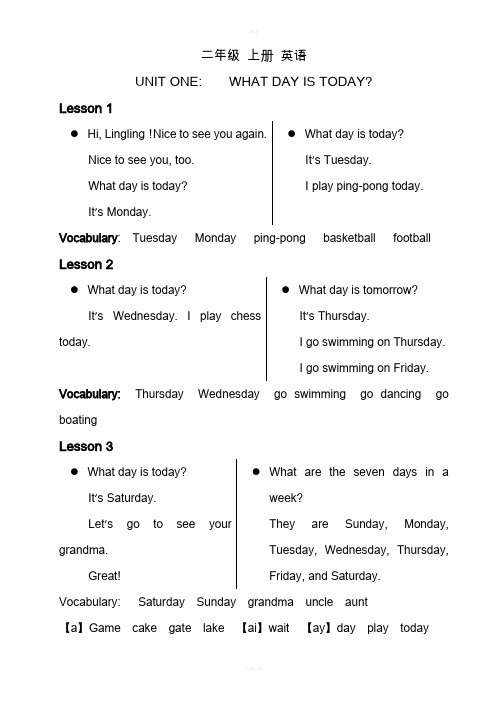
二年级上册英语UNIT ONE: WHAT DAY IS TODAY? Lesson 1●Hi, Lingling!Nice to see you again.Nice to see you, too.What day is today?It’s Monday.●What day is today?It’s Tuesday.I play ping-pong today.Vocabulary: Tuesday Monday ping-pong basketball football Lesson 2●What day is today?It’s Wednesday. I play chess today.●What day is tomorrow?It’s Thursday.I go swimming on Thursday.I go swimming on Friday.Vocabulary: Thursday Wednesday go swimming go dancing go boatingLesson 3●What day is today?It’s Saturday.Let’s go to see your grandma.Great!●What are the seven days in aweek?They are Sunday, Monday, Tuesday, Wednesday, Thursday, Friday, and Saturday.Vocabulary: Saturday Sunday grandma uncle aunt【a】Game cake gate lake 【ai】wait 【ay】day play today●Dave’s waiting for his kate at the gate.●I go boating on Sunday.UNIT TWO WHAT DO YOU DO ON SUNDAY? Lesson 5●Do you go to the park on Saturday,Kate?Yes, I do. ●Do you have classes on theweekend?No, we don’t.Vocabulary: park cinema bookstore museum Lesson 6●What do you do on Saturday?My parents and I go to the farm. I play with the animals. ●What do you do onSunday?I go to the zoo. I likeanimals.Vocabulary: go to the zoo draw pictures read books Lesson 7●What do you do on Saturday?I often go to see a film.I often go to see my grandma andgrandpa. ●It’s Sunday. Let’s go to thepark.We can play football orbasketball.Vocabulary: go to see a film go to buy books go to see my grandparents●It’s Saturday. Do you go to the park today? No, I don’t.【e】we he evening 【ea】eagle leaf peach【ee】week see queen knee 【ey】keyA peach for each and one for the queen.You see a key on his knee.UNIT THREE WHAT’S YOUR NUMBER? Lesson 9●My number is eleven.What’s your number?My number is twelve. ●What’s Lala’s number?Her number is thirteen.●What’s Kata’s number?Her number is fourteen.Vocabulary: twelve thirteen fourteen fifteen Lesson 10●How many pigs do you have onyour farm?I have sixteen pigs. ●I have seventeen hens onmy farm.I have eighteen cows.Vocabulary: pigs sixteen ducks ten sheep seventeen horses nineLesson 11●How many girls do you have inyour class?We have twenty boys in our class.We have nineteen girls. ●How many classes do youhave this afternoon? Two or three?I have only two.Great! Let’s go and play afterclass. Vocabulary: boys girls twenty nineteen【i】I hi tiger friday nine ice like nice white【y】my sky tryice cream white ice cream my white ice creamI like my white ice cream.UNIT FOUR THERE ARE MANY ANIMALS. Lesson 13●There are many animals in thezoo.Let’s go and see them. I like big animals.I like small animals. ●Are there elephants in thiszoo?Yes, there are four.Vocabulary: monkeys five elephants four pandas two Lesson 14●Yangyang, look at the four babycats.Oh, they are thin.Do you like cats?Yes, I do. I like dogs, too. ●Do you like dogs, Guoguo?Yes, I do. I like birds, too.I have two birds.Vocabulary: cats rabbits tigers giraffes dogs foxes lions zebrasLesson 15●There are so many toys.Are there monkeys?No,there aren’t. There are bears. ●I like these tigers. Do you likethem?No, I don’t. I like the pandas.Vocabulary: monkeys tigers bears kangaroos 【o】go so UFO old nose【oa】boat coatYou hav a coat, I have a boat.Take your coat, go to my boat.UNIT Five I HAVE LONG ARMS. Lesson 17●What’s this? Please guess. It hasbig ears.It’s an elephant.No, it isn’t. ●It has red eyes and whitehair.It’s a rabbit.Yes, it is.Vocabulary: a panda a zebra a monkey a kangaroo a fox an elephantLesson 18●It has a long neck and short legs.What animal is it?Let me think. Is it small?Yes, it is. ●It has a short tail. It’s blackand white. What animal isit?No, it isn’t.It’s a turtle. Is it small?It’s a panda. Vocabulary: tail ears eyes hair nose big small long short Lesson 19●I have long arms. Do you havelong arms?No, I don’t. I have short arms. ●I have strong legs and a bigbody.I have a small body. But I havehands.Vocabulary: long arms a small mouth a short neckshort arms a big mouth a long neck 【u】UFO uniform cute●You are wearing a cute uniform.Can you draw a cute UFO?UNIT SIX IT’S SHRISTMAS DAY Lesson 21●Happy birthday to you,Lingling!Thank you. I’m so happy today.●How old are you?I’m eight. Have some cake, please.Thank you.Vocabulary: eight six three Lesson 22●Merry Christmas!Merry Christmas to you, too! ●Look at the snowman.It has a big nose.Look at the Christmas tree.How pretty it is!How lovely it is!Vocabulary: the Christmas tree pretty Kate happythe Christmas gift nice the Christmas card cute Lesson 23●Happy new year, Lingling!The same to you, Baobao.Let’s make a snowman.Ok! Let’s go. ●It has long arms and a bigbody.It has black eyes.Let’s take photos.Vocabulary: make a snowman make a cardsing and dance watch the fireworks 【ou】house mouse out 【ow】how cow●How did the cow get into the house?How did the mouse get out of the house?谢谢观看! 欢迎您的下载,资料仅供参考,如有雷同纯属意外。
小学英语六年级上册Unit2第三单元我的周末计划释义

小学英语六年级上册Unit2第三单元我的周末计划释义Main scene (教材页码P22-23)原文:What are you going to do in the nature park?翻译:你要在自然公园做什么?原文:I'm going to draw some pictures.翻译:我要去画画。
原文:What about you?翻译:你呢?原文:I'm going to look for some beautiful leaves.翻译:我要找一些好看的叶子。
原文:Mike is going to see a film.翻译:迈克要去看电影。
原文:John is going to buy his favourite comic book.翻译:乔恩要去买她最喜欢的漫画书。
原文:Hmm, what am I going to do this weekend?翻译:嗯,我这周末要去做什么?A Let's try (教材页码P24)一起试试原文:It's Saturday morning. Sarah is on the phone with Mike. 翻译:星期六早晨。
萨拉和迈克打电话。
Listen and circle.听并圈出。
原文:Hi, Sarah.翻译:你好,萨拉。
原文:Good morning, Mike.翻译:早安,迈克。
原文:Today is so warm. Let's go swimming.翻译:今天好暖和。
我们一起去游泳吧。
原文:Sorry, I can't. I have to do my homework now. 翻译:对不起,我不能。
我现在必须做作业。
原文:OK. What about this afternoon?翻译:好。
今天下午呢?原文:No, I can't. I'm going fishing.翻译:不行。
小学英语新起点四年级上册Unit 2 On the WeekendLesson 2-章节测试习题
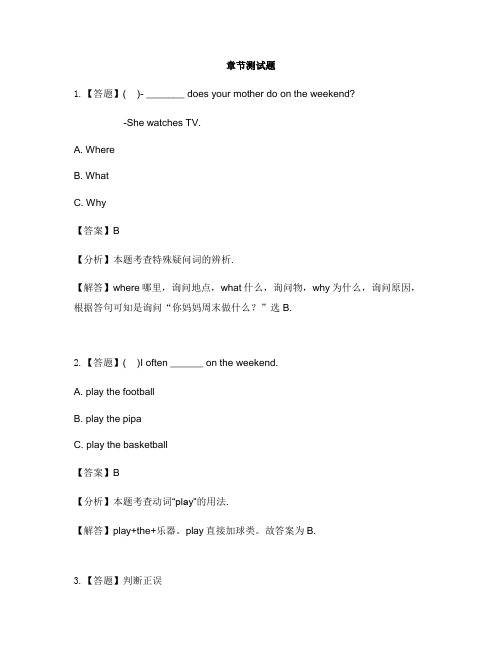
章节测试题1.【答题】( )- _______ does your mother do on the weekend?-She watches TV.A. WhereB. WhatC. Why【答案】B【分析】本题考查特殊疑问词的辨析.【解答】where哪里,询问地点,what什么,询问物,why为什么,询问原因,根据答句可知是询问“你妈妈周末做什么?”选B.2.【答题】( )I often ______ on the weekend.A. play the footballB. play the pipaC. play the basketball【答案】B【分析】本题考查动词“play”的用法.【解答】play+the+乐器。
play直接加球类。
故答案为B.3.【答题】判断正误( ) I like to play computer games.【答案】T【分析】本题考查看图作答。
【解答】句意:我喜欢玩电脑游戏。
与图片相符。
4.【答题】oftenIjumponweekendstherope.______ ______ ______ ______ ______ ______ ______ ______【答案】I often jump the rope on weekends.【分析】本题考查连词成句。
【解答】我I,often经常,jump the rope跳绳,on weekends在周末,故为I often jump the rope on weekends.5.【答题】连线。
1. What do you do after lunch? A. I am a teacher.2. When do you go shopping? B. At 8:00 a.m.3. What do you do on the weekend? C. I often go shopping on Saturday.4. When do you eat breakfast on Sunday? D. I usually clean my room.5. What do you do? E. I go for a walk with my mom after lunch.【答案】E C D B A【分析】本题考查对话搭配。
初中英语八年级上册-Unit 2 单元综合能力训练 人教版英语(有答案)

Unit2 单元综合能力训练新词对对碰:重点词语达达标I. 根据句意及首字母或汉语提示完成单词。
1.The young people often eat j_________ food.2.Tom is good at basketball a_________ he isn't very tall.3.Nowadays many people buy things on the I_________ at home instead of going to the shops.4.Why do you like this TV p_________?5.Tom has a_________ (摇摆)dance lesson on Friday.II. 根据中文写出单词或短语。
1.一个16岁的高中生_____________________2.超过两小时___________________________3.看牙医_______________________________4.少于______________________________5.清洁牙齿__________________________6.许多,大量_______________________________要点跟踪练:重点知识演练场I. 单项选择。
1.WOLF is to FLOW as 8526 is to_____________.A.2856B.6258C.5862D.56822.Mr. Li asks the students in the river, because it’s too dangerous. A.swim B.to swim C.not to swim D.to not swim3.-You look so tired, Sue.-I__________ slept last night. I feel terrible now.A.almost B.hardly C.usually D.always4.We couldn’t buy anything because ______ of the shops were open.A.all B.bothC.nothing D.none5.It is terrible. It's raining so ________ that we can ________ go out.A.hard; hardly B.hard; hard C.hardly; hard D.hardly; hardly II. 从(II)中选择合适的句子补全(I)对话,有两项多余。
二年级上册英语教案-Unit2WHATDOYOUDOONSUNDAYLesson7北京课改版

二年级上册英语教案Unit 2 WHAT DO YOU DO ON SUNDAY?Lesson 7 北京课改版教学内容:本课为北京课改版二年级上册英语Unit 2的Lesson 7,主题为询问星期天的活动安排。
教学内容围绕日常生活中的活动,例如购物、阅读、运动等,通过听力、口语、阅读和写作活动,让学生掌握询问和描述星期天活动的句型。
教学目标:1. 学生能够理解并运用核心句型“What do you do on Sunday?”来询问他人的星期天活动。
2. 学生能够运用所学词汇描述自己在星期天的活动,如“I read books/watch TV/play sports on Sunday”。
3. 学生能够听懂并准确发音单词,如“read, watch, play, sports”等。
4. 学生能够通过小组活动,提高合作能力和英语交流能力。
教学难点:1. 学生对于星期天活动的描述可能存在词汇和句型上的困难。
2. 学生在听力练习中可能难以辨识不同的活动词汇。
3. 学生需要理解并运用正确的时态来描述星期天的活动。
教具学具准备:1. 课件或黑板,用于展示和讲解句型和词汇。
2. 听力材料,如CD或MP3播放器。
3. 小组活动道具,如卡片或小道具,用于模拟星期天的活动。
教学过程:1. 导入:通过图片或简短对话,引导学生回顾上一课的内容,引入本课的主题。
2. 新课内容展示:利用课件或黑板,展示核心句型和词汇,通过例句和图片,让学生理解句型的含义和用法。
3. 听力练习:播放听力材料,让学生听懂并跟读核心句型和词汇,提高听力理解和发音准确性。
4. 小组活动:学生分成小组,使用道具模拟星期天的活动,用英语进行交流和描述。
板书设计:1. 核心句型:“What do you do on Sunday?”和“I readbooks/watch TV/play sports on Sunday”。
2. 重点词汇:read, watch, play, sports等。
人教PEP版 五年级英语上册unit 2 my week 单元检测题含听力材料和答案
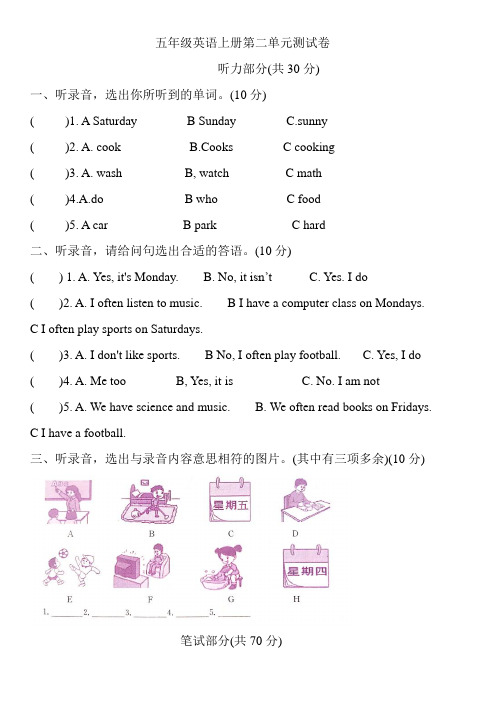
五年级英语上册第二单元测试卷听力部分(共30分)一、听录音,选出你所听到的单词。
(10分)( )1. A Saturday B Sunday C.sunny( )2. A. cook B.Cooks C cooking( )3. A. wash B, watch C math( )4.A.do B who C food( )5. A car B park C hard二、听录音,请给问句选出合适的答语。
(10分)( ) 1. A. Yes, it's Monday. B. No, it isn’t C. Yes. I do( )2. A. I often listen to music. B I have a computer class on Mondays.C I often play sports on Saturdays.( )3. A. I don't like sports. B No, I often play football. C. Yes, I do ( )4. A. Me too B, Yes, it is C. No. I am not( )5. A. We have science and music. B. We often read books on Fridays.C I have a football.三、听录音,选出与录音内容意思相符的图片。
(其中有三项多余)(10分)笔试部分(共70分)四、读一读,判所所给单词画线部分的读音是(T)否(F)相同。
(10分) ( )1. A. read B.bread C. teacher( )2.1. eat B.tea C, head( )3. A beef B. meet C.feed( )4. A. meat B. eat C. repeat( )5.A clean B. please C. Breakfast五、根据图片写出单词或短语。
鲁科版(五四学制)英语四年级上册课文同步内容英语字帖Unit3

鲁科版(五四学制)英语四年级上册课文同步内容英语字帖衡水体描红+临摹(三年级起点)说明:黑白打印,效果正常。
如网页显示单词对不齐线格,请放心下载,原文件是正常的。
Unit3Days of the week Lesson1What day is today?1.Listen and say.What day is today?What day is today?今天是星期几?I t's Wednesday.I t's Wednesday.学习有智慧淘店制作是星期三。
I like Wednesday.I like Wednesday.我喜欢星期三。
We have music on Wednesday.We have music on Wednesday.我们星期三有音乐课。
I like Tuesday and Friday.I like Tuesday and Friday.我喜欢星期二和星期五。
We have English.We have English.我们有英语课。
I like Monday and Thursday.I like Monday and Thursday.我喜欢星期一和星期四。
Me too.We have science.Me too.We have science.我也是。
我们有科学课。
2.Let's talk.说一说What day is today?What day is today?今天是星期几?I t's Wednesday.I t's Wednesday.是星期三。
3.Let’s do.做一做What day is today?What day is today?今天星期几?I t’s Tuesday.I t’s Tuesday.是星期二。
What subjects do we have on Tuesday?我们星期二有什么课?What subjects do we have on Tuesday?We have maths...We have maths...我们有数学……Lesson2I can dance on Friday.1.Listen and say.听录音并说一说What day is today?What day is today?今天是星期几?I t's Thursday.I t's Thursday.是星期四。
北京版-英语-一年级下册-Unit 2 What do you do Lesson 6 教案

UNIT TWO WHAT DO YOU DO?Lesson 6教案教学目标(Objectives):1.确保学生认识和理解一些基本单词的意义和简单口头运用(To learn the meaning and simple usages of some words and phrases)。
需要掌握的词组:HeadHair2.学习使用本单元重点句型及表达(To use the typical sentences to express)。
需要掌握的句型:What do you do in the evening?I go to...3.鼓励学生大胆发言及表达(To encourage the students to express bravely)。
4.培养学生对英语学科的兴趣(To make the students interest in English learning)。
5.增强学生听说读写译的能力(To strengthen the ability of listening, speaking, reading, writing and translating)。
教学重点(Key Points):在学习了单词的基础上,以单词为载体,进行主要句型的学习,并了解其中的语法现象,根据具体情境,学会交流对话,侧重句型语法学习,交际意向和课外拓展为重点。
教学方法:游戏,音频,情景教学法,Pair-work两人小组活动,Group-work小组活动,多媒体辅助教学。
教学难点:学生处于小学阶段,对英语有了初步了解,词汇储备较少,对于三年级下学期学生的要求重点是在会读会说的基础上,能掌握一些基本单词的拼写和造句,了解一定的语法内涵,与人进行简单沟通交流。
教学准备:课件、照片素材、音频文件、教学道具。
教学设计:Step1.GreetingStep2.Warm-up/Leading(热身/课程导入)Warm-up Question1)你如何问候别人中午做什么?2)Survey:What do you do in the afternoon?I have PE class.Step3.Presentation(呈现新课)1.Words Learning!1)老师放映课件,用中文询问同学看到了什么?同学们会看到课件上呈现的图画。
新版PEP五上英语第二单元

课题PEP5 Unit2 Lesson1教学目标:知识目标1.能听说读写Monday, Tuesday, Wednesday, Thursday,Friday,Saturday,Sunday.并能根据实际情况替换关键词进行熟练应用。
2.能听懂会说What do you have on Monday/…? We have Chinese,music ….and art.技能目标1. 能根据实际情况替换关键词进行熟练应用What do you have on Monday/…? We have Chinese,music ….and art.。
情感目标1.热爱学校生活。
教学重难点:1.掌握四会单词Monday, Tuesday, Wednesday, Thursday,Friday,Saturday,Sunday. 2.Tuesday 和Thursday的读音Wednesday 和Saturday的拼写。
一周每一天的单词第一个字母要大写。
3.各学科的名称以及句式We have….来表述一周的安排。
课前准备:1.匹配的PPT课件2.单词卡片3.班级课表教学过程Step1 .OrganizationGreeting each other.Free talk.Step2 .Revision1.四上let’s doTime for breakfast. Drink some milkTime for lunch. Eat some chicken.Time for dinner. Eat some rice.Time for music. Sing and dance.Time for PE. Jump and run.2.复习学科类的单词,并把卡片贴在黑板上。
如English, Chinese, maths, science, art, PE,computer.以小组认读比赛进行小组加分比拼。
Step3.Presentation1.词汇教学(1)Monday教师指着课表上的周一边问边答What day is it today? It’s Monday/ Tuesday/Wednesday/ Thursday/Friday.边说边板书。
(PEP)五年级英语上册 Unit 2 第1课时
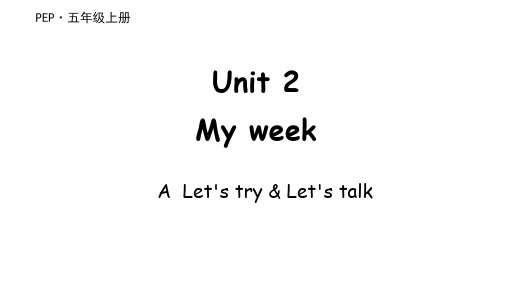
Unit 2 My week
A Let's try & Let's talk
Warm up
Free talk
What subjects do you have? What subject do you like best?
art
music
Chinese
English
maths
6 Grandpa? ( 3 ) I have a cooking class with your grandma! ( ) I have maths, English and music.
Let’s talk.
What do we have on Wednesdays and Thursdays?
A. Yes, I do. I love art. B. I do my homework. C. We have Chinese, maths and art.
Homework
1. Listen, read and recite the dialogue. 2. Copy the key sentences.
Wednesdays? John: I have art. I really like it.
John has art on Wednesdays. What does he have on Thursdays?
Thursday
Listen and answer
Today is Wednesday. Tomorrow(明天) is _T_h_u_r_s_d_a_y__. John has _m_a_th_s_, _E_n_g_li_sh_ and _m_u_s_ic_ on Thursdays.
人教PEP版五年级英语上册《Unit2》精品教案教学设计小学优秀公开课2
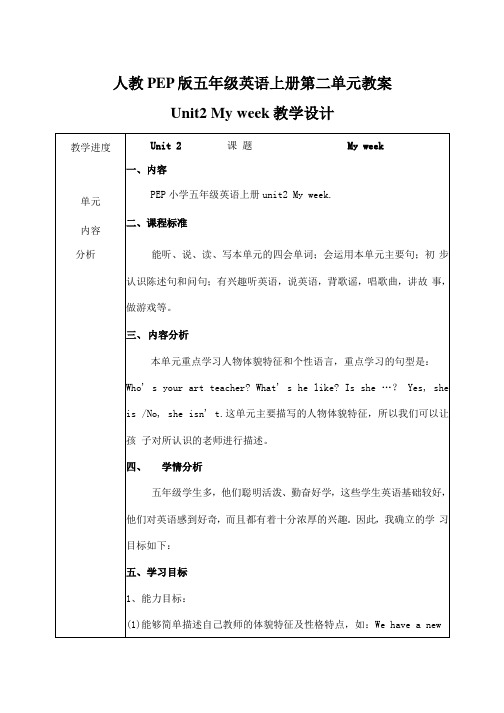
1.听音训练:听录音并写出听出的单词。
3.使学生养成用英语交流的习惯,培养良好的语音语 调和语感.
教具准备:教学光盘、单词卡片。
教学重难点:
重点:能够在情境中询问他人的课程安排以及作答.
难点:掌握表示星期几单词的书写.
Step 1. Warming up
唱歌曲Days of the week.
Review the words.
)呈现单词卡:星期几,
3.能够听懂会说会表演对话内容,并在真实情境中运 用所学语言进行真实交流.4.在对话交流中使学生 养成用英语交流的习惯,培养良好的语音语调和语感.
教具准备:
1.教师准备教学过程中所需要的图片、声音、课件, 以及本课时的单词卡。
2.教师准备相关媒体的播放设备,如录音机、投影仪、 幻灯片等。
教学重难点:
Listen and do.教师发给学生印有星期几的单词 卡片,教师说单词,学生快速反应起立.
Step2. Presentation
学习Main scene.
)出示主情景图,观察并思考:Who are they? What
are they talking about?
)学生仔细观察图片,展开合理想像并回答老师的问
)教师领读,学生齐读,开火车读单词.
)一个学生说英语,一个学生说汉语.
Step2. Presentation
学习Let' s learn
个性化设计&师生
活动
S1:I have PE, music, science and English.
S2: Is it Monday?
S1: No.
S2: Is it Friday?
四年级上册英语优质教案-Lesson 11 Toys |冀教版
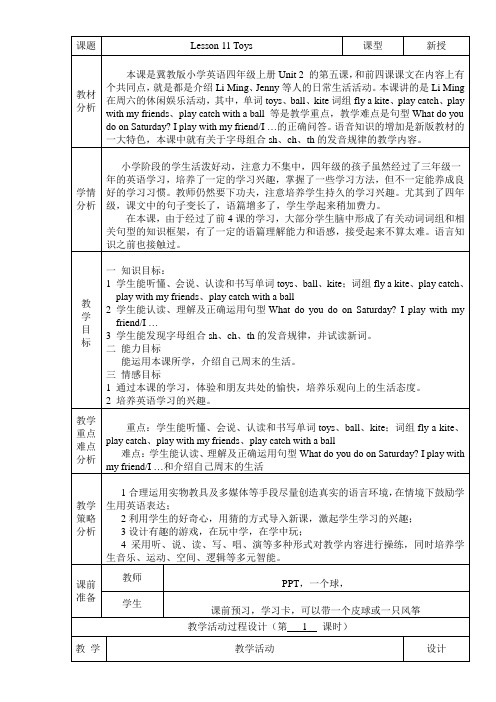
Lesson13: At school 教学设计冀教版小学英语四年级上册Lesson14 Near and Far教学设计教学内容分析:冀教版小学英语四年级Lesson14: Near and Far,本课围绕问路这一话题从Near or Far;Is the library far from here?;let’s do it 三部分进行语言知识传授(Near and Far)和语言操练(在学校附近如何找到路),三部分联系较紧密,环环相扣,学习起来较容易。
学生情况分析:四年级的学生。
他们大部分已经接触了一年英语,有一定的英语基础。
儿童的特性使得他们活泼好动,对新事物有着强烈的好奇心,探索知识的欲望很强烈,并且有着很强的表现欲。
教师应采用新颖活泼有趣的教学形式进行教学,保持并提高学生学习英语的兴趣。
教学目标:知识与技能目标:能听懂、会说、认读、和书写下列词汇:near, far from the.能认读、理解并运用下列基本的句型结构…is far from……is near…能听懂、会说下列句子: Is it far from here? No, it’s near.学习策略目标:能使用日常交际用语,活用句型,进行简单问路的交流,做到大胆开口,发音正确。
情感态度目标:通过表演、小组合作、歌曲等多种活动,激发和培养学生学习英语的兴趣,调动学生的积极性,使学生在不断体验成功的快乐的同时,增强英语学习的信心。
T: Look around our classroom. There are some pictures. (Point to one o f them.) What’s this?Ss: This is a school.T: Yes. Now let’s ask and answer the all pictures. (What’s this? It’s a s chool.)The students ask and answer loudly together.2、Pair work. Act out the dialogue.T: Very good. Next, check your recitation.The students recite the part 3.T: Good job. Now can you act out the dialogue of the pictures? (Give them an example and two minutes to practice.)The students show their dialogues. (Choose three pairs at least to sho w.)Let the students read the dialogues of the other pictures together.三、New concepts.1、Near or far?①T: You did a good job! Today, we will learn “Lesson14 Near and Far”. Compare the two pictures, please. Try to guess the meanings, “near and far”? (show the first slide)Ss: 近的、远的。
北京版英语二年级上册Unit2WhatdoyoudoonSundayLesson5_参考教案

Lesson5 参考教案【内容来源】北京出版社(一起点)二年级上册Unit2 What do you do on Sunday?一、教学目标与要求(Teaching aims and request)1. 能用“Do you ... on ...?”询问他人“周几是否做什么”,并能用“Yes, I do. /No, I don’t.”回答他人的询问。
2. 能听懂、指认并读出单词park、class、we、cinema、bookstore和museum,并能用go to the park/ ... 表达“去哪里”。
3. 能跟随录音说唱小韵文。
二、教学重点、难点(Teaching points and difficulties)(一)重点(Points)能用“Do you ... on ...?”询问他人“周几是否做什么”,并能用“Yes, I do. /No, I don’t.”回答他人的询问。
(二)难点(Difficulties)1. 单词weekend、bookstore 和museum 的发音。
2. 单词you表达“你”“你们”两个意思,要根据具体情况用I或we回答他人“Do you ... ?”的提问。
三、课前准备(Teaching preparation)本单元单词图片、配套光盘、学生活动用书、星期单词手举牌。
四、教学建议(Teaching suggestions)(一) Listen and say1. 导入(1) 教师与学生共同演唱歌曲Days of the Week (歌词在教材第62页),复习一周七天的英语表达。
(2) 教师呈现自制的Kate一周日程表并戴上Kate的头饰向学生介绍自己一周的日程安排:(下图仅供参考)Hello, boys and girls. Glad to see you again! I am a busy cat. I go fishing on Sunday! I draw pictures on Monday. I play games on Tuesday. I call my friends on Wednesday. I play games on Thursday. I paint a picture on Friday. How about Saturday? Can you guess?教师引导学生用“Do y ou...?”进行猜测。
人教版小学六年级上册英语课文翻译(全册)
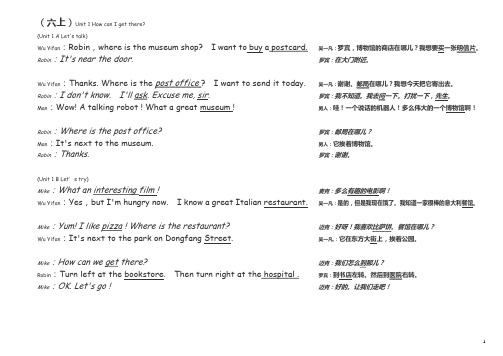
134supermarket 超市 evening 晚上,傍晚 l esson 课5奥利弗:好主意!78910W: What size are your shoes, Mike?M: Size 7W: Size 7? That’s so small.than mine. My shoes are size 37. M: Really? You lookM: I’m 48 kilogram sW: Yes, you’re heavier. I’m 46 kilograms.迈克:橱窗里的那些鞋很漂亮!让我们看一看。
吴一凡:迈克,你穿多大号的鞋?迈克:7号。
countryside 乡村吴一凡:7号?那真小。
迈克:在中国我穿38号的鞋。
吴一凡:哦!你的脚比我的大。
我穿37号的鞋。
迈克:真的吗?你看起来比我高。
吴一凡:但是我认为你更重。
你体重多少?迈克:我体重48千克。
吴一凡:是的,你更重。
我体重46千克。
11(Unit 1, B: Read and write)Little Duck is watching the sun go down., but his shadow is getting long er and long er.“Why is that?” his friend Old Tree.“You are old er and than me.Tell me –why is my shadow long er when the sun get s lower?”Old Tree say s ,”That ’s easy, Little duck.The sun go es down every day, and we grow old er every day. Your shadow grow s long er because you are growing tall er . You are becoming a beautiful bird!”M: Isome children’s show s on TV.M :Yes ,I my room and my clothes.G :它正变得越来越低,但是他的影子正变得越来越长。
- 1、下载文档前请自行甄别文档内容的完整性,平台不提供额外的编辑、内容补充、找答案等附加服务。
- 2、"仅部分预览"的文档,不可在线预览部分如存在完整性等问题,可反馈申请退款(可完整预览的文档不适用该条件!)。
- 3、如文档侵犯您的权益,请联系客服反馈,我们会尽快为您处理(人工客服工作时间:9:00-18:30)。
Unit2 WHAT DO YOU DO ON SUNDAY?
Lesson 7
教案
一、学情分析:
对于小学生,周末活动安排及学校生活是他们再熟悉不过的,尤其是自己的周末怎么过,现在的孩子业余生活也很丰富,设计课堂教学时除课文中的play football, play basketball等。
二、教学目标:
1.全体学生能理解词汇often, Let’s, play, football, basketball.
2.部分学生能初步运用What do you do on Saturday?、Let’s go to...来谈论活动安排。
3.全体学生能够感知含有实意动词的一般现在时特殊疑问句语音语调。
4.全体学生能听懂、会说What do you do on Sunday?
三、教学重难点:
1.能运用句型What do you do on Sunday?、Let’s ...谈论活动安排。
2.生活中运用What do you do on Sunday?询问别人的活动安排。
四、教具准备:
卡片、课本、多媒体
三、教学过程:
(一)热身
1、Greetings
2、出示单词卡
Go to see a film, go to buy books, go to see my grandparents
(二)呈现
提问What do you do on Sunday?
Listen and repeat(注意模仿语音语调)分角色朗读。
(三)练习
1. 出示课文挂图,播放录音或教学光盘,请学生跟读,然后全班分角色朗读,表演对话。
2. 请学生先观察Let’s act! 部分的内容,使用“What do you do on Sunday?”句型在小组内进行替换练习,然后分小组表演。
四、作业
1. 听录音,模仿跟读。
2. 使用“What do you do on Sunday?”句型与同学进行对话。
